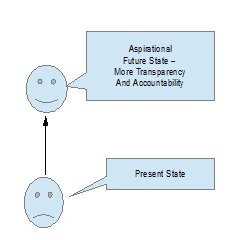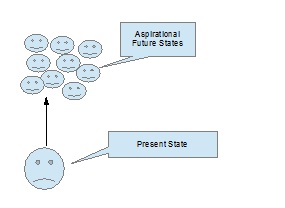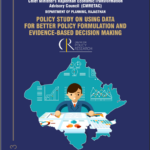
Of Dolphins, Transparency and TABridge
7 January 2013
“We policy people are like dolphins – extremely intelligent, but it looks like nobody knows how to communicate with us.” This quote, by Matt from Indigo Trust is by far my favourite quote from the TABridge session a few weeks ago at Glen Cove, New York. It beautifully sets the context of why this conference was held: to help foster conversation between technology experts and groups working on transparency and accountability (T&A) issues. The term T&A was left loose to encourage participation. Participants ranged from organizations working on natural resource governance, budget transparency, open governments, and data transparency, as well as technology experts on mobiles, visualization and so on. Accountability Initiative was invited to share its experiences, both for its work on budget transparency and for its experience in facilitating similar conversations between policy wonks and technology experts within India (at the bar-camp we held in 2010).
The 3-days session was structured as an unconference (a user-generated conference) and, in my opinion, this format was perfect for fostering conversations about a complex problem. And when I say complex, I am using my words very carefully. Influencing public policy and public institutions to be more transparent and accountable lies in a category of problems defined as “wicked problems” (introduced by Horst Rittel[1] and Ron Heifetz in the early 1970s). In layman’s terms, problems can be classified as simple, complicated and complex (or wicked)[2].
– “How do I attend the Glen Cove conference?” is an example of a simple problem. You follow a series of steps like booking an air ticket, talking to the coordinator and so on, and you can attend it.
– A complicated problem would be something like putting a man on the moon. It requires coordination between various teams and hundreds of people, but once you put a man on the moon, it becomes a solved problem. Repeat the steps and most likely you would have another person on the moon.
– And then there are complex problems. The characteristics of complex problems can be seen in Rittel’s paper, but I will use the analogy of raising children to explain it. Previous expertise in raising children can contribute to better parenting but it is neither a necessary nor sufficient condition to assure success in raising the next kid. Formulae don’t work in parenting. Similarly with introducing transparency and accountability in a community: you have to know the community and the context afresh every time.
Introducing transparency and accountability seems to be a complex problem if we judge it against the ten characteristics identified by Rittel in his paper. But why does this matter? Understanding that we are dealing with a complex problem, and not just a complicated problem, helps us choose the correct problem-solving technique. Research on complex-problem solving is ongoing, but here are a few key points to keep in mind
- Recognition of ‘Asymetry of ignorance’ – Rittel stated that the knowledge required to solve a complex (wicked) problem never resides with a single person. Instead, there is symmetry of ignorance, where both knowledge and ignorance are distributed equally over all participants and no-one ‘knows better’ by virtue of having an advanced degree or being familiar with the subject.” Accordingly, the process of problem-solving must involve those who are directly affected by the problem so as to come up with sustainable solutions.Agenda-setting at TABridge was treated as a complex problem – all of us were equally ignorant (and in the same breath, equally knowledgeable) about technology and transparency. So we sat down in groups and discussed the challenges we were facing in implementing technology and introducing transparency, and the broader trends we wanted to understand. We jotted them on post-its put up on a wall. We then went through them, and either volunteered to speak about a topic, or expressed interest in some session. Through this process of collective agenda-setting, we came up with an intense 3-day session list.
Similarly, when solving a budget transparency problem, it’s important to involve all stakeholders including communities in the conversation. Experts don’t know it all and neither do communities.
- Defining terms and outcomes – All of us are working towards a future where there is more transparency and accountability.

These states can be further broken down. Take the example of participation in an SMC – to a parent that means signing off on cheques, to a teacher it means just reading out the statement of accounts to the parents, while to the government it means that parents actually set the school agenda for the year. Thus, even a simple aspirational state can be broken down and this process can become iterative.
Rittel recognized this iterative decomposition as a characteristic of complex problems when he said, “There is no definitive formulation of a wicked problem.” Research on complex problem-solving shows that the way forward is to develop a shared understanding amongst stakeholders and subsequently evolve a shared goal. This can’t be emphasized enough. In the absence of this, whatever solution, no matter how technically sound, is most likely going to fail[3].
Problems in developing a shared understanding: Developing a shared understanding and a shared goal is difficult to achieve in general, and specifically on policy issues, since it involves understanding the data behind events. This brings me to a topic of data literacy. In an increasingly data-driven society, flawed interpretation can lead to a wrong understanding of the problem or worse, a huge waste of public money. Richard Sterling, former head of the web site, data.gov.uk said it best when he stated:[4] “individuals may be coming to conclusions that weren’t quite valid after browsing the 5,850 data sets available on the site.” In fact, this paper here, explores how a flawed understanding of data can lead to a huge waste of public money.[5]To avoid such problems, data-literacy needs to be inculcated as an important civic-skill. But what is data-literacy? From our session on this topic at TABridge, I realized that this skill needs to be seen both from the perspective of the provider and the recipient of data. On the one hand, a data-literate provider would be able to put data out in a manner that allows for simple and correct interpretation. He/she would have a good understanding of data scraping, publication and visualization tools, as well as knowledge of data portals so they can put their data out. A data-literate recipient, on the other hand, would be one who can correctly identify, retrieve, evaluate and use information, not only to ask, but also answer meaningful questions of data.
- Strategy not technology – This point flows out from the previous one and going into it would take an entire blog post by itself. Put simply, it refers to how technology needs to be seen as a step towards achieving a shared goal, rather than as the end goal, as a lot of non-profits tend to do.
Hopefully by applying what we’ve learnt from complex problem-solving us dolphins would be able to talk to the rest of the world, collectively decide on what a more transparent and accountable society means, and use technology and data to reach our goals.
[1] Rittel, Horst, and Melvin Webber; “Dilemmas in a General Theory of Planning,” pp. 155–169, Policy Sciences, Vol. 4, Elsevier Scientific Publishing Company, Inc., Amsterdam, 1973.
[2] I got the idea of simple, complicated and complex problems from this blog, an excellent blog on how dialog-mapping is used for collaboration. http://www.cleverworkarounds.com/2012/09/08/confessions-of-a-post-sharepoint-architect-the-self-fulfilling-governance-prophecy/
[3] Developing a shared goal can be done in one of two ways – authoritative or collaborative – and in his paper, Rittel hints at the advantages of the latter.
[4] http://pearsonblueskies.com/2011/how-open-data-data-literacy-and-linked-data-will-revolutionise-higher-education/
[5] The most dangerous equation of all – http://press.princeton.edu/chapters/s8863.pdf. This paper talks about how flawed interpretations of data can lead to loss of millions of dollars.





